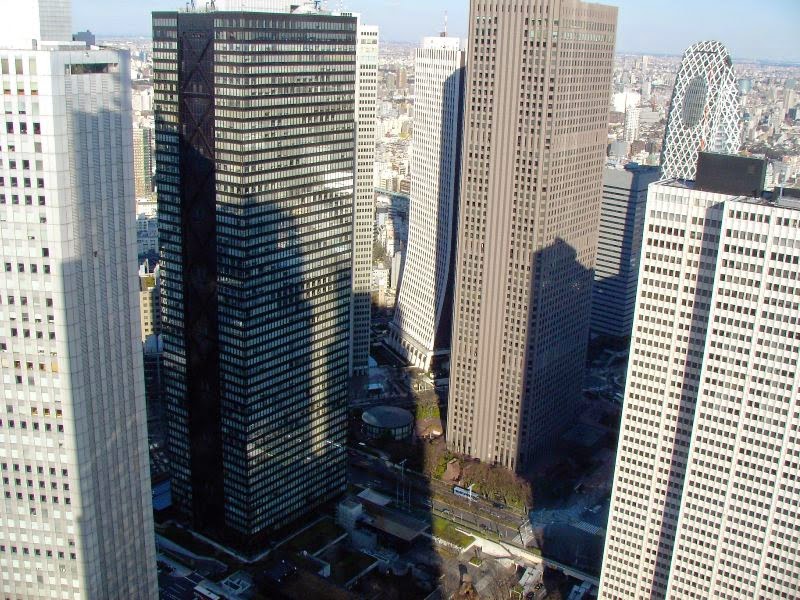Tokyo
After Exiting from the Financial Crisis
In September 2008, the US economy plunged into a kind of Great Depression triggered by a large scale of illegal sub-prime loan frauds, involving economies all over the world.
However, CIA has analyzed that the crisis is virtually going to end eventually; the US is exiting the Financial Crisis.
United States Economy 2014
Page last updated on January 31, 2014
Economy - overview:
The US has the largest and most technologically powerful economy in the world, with a per capita GDP of $49,800.
...
The sub-prime mortgage crisis, falling home prices, investment bank failures, tight credit, and the global economic downturn pushed the United States into a recession by mid-2008. GDP contracted until the third quarter of 2009, making this the deepest and longest downturn since the Great Depression. To help stabilize financial markets, in October 2008 the US Congress established a $700 billion Troubled Asset Relief Program (TARP). The government used some of these funds to purchase equity in US banks and industrial corporations, much of which had been returned to the government by early 2011. In January 2009 the US Congress passed and President Barack OBAMA signed a bill providing an additional $787 billion fiscal stimulus to be used over 10 years - two-thirds on additional spending and one-third on tax cuts - to create jobs and to help the economy recover. In 2010 and 2011, the federal budget deficit reached nearly 9% of GDP. In 2012 the federal government reduced the growth of spending and the deficit shrank to 7.6% of GDP. Wars in Iraq and Afghanistan required major shifts in national resources from civilian to military purposes and contributed to the growth of the budget deficit and public debt. Through 2011, the direct costs of the wars totaled nearly $900 billion, according to US government figures.
...
In late 2013, the Fed announced that it would begin scaling back long-term bond purchases to $75 billion per month in January 2014 and reduce them further as conditions warranted; the Fed, however, would keep short-term rates near zero so long as unemployment and inflation had not crossed the previously stated thresholds. Long-term problems include stagnation of wages for lower-income families, inadequate investment in deteriorating infrastructure, rapidly rising medical and pension costs of an aging population, energy shortages, and sizable current account and budget deficits.
GDP (purchasing power parity):
$16.24 trillion (2012 est.)
country comparison to the world: 1
$15.81 trillion (2011 est.)
$15.52 trillion (2010 est.)
note: data are in 2012 US dollars
[see also: GDP country ranks ]
GDP (official exchange rate):
$16.02 trillion (2012 est.)
GDP - real growth rate:
2.8% (2012 est.)
country comparison to the world: 116
1.8% (2011 est.)
2.5% (2010 est.)
GDP - per capita (PPP):
$51,700 (2012 est.)
country comparison to the world: 13
$50,700 (2011 est.)
$50,100 (2010 est.)
note: data are in 2012 US dollars
Gross national saving:
12.5% of GDP (2012 est.)
country comparison to the world: 118
11.4% of GDP (2011 est.)
11% of GDP (2010 est.)
GDP - composition, by end use:Indeed, at the start of 2000s, when Mr. W. Bush was elected as president, the US was not suffering the War on Terror and the Financial Crisis. With Mr. Obama assuming office of presidency, the two crises started to look like being conquered and controlled.
household consumption: 68.6%
government consumption: 19.5%
investment in fixed capital: 14.8%
investment in inventories: 0.4%
exports of goods and services: 13.5%
imports of goods and services: -16.9%
(2012 est.)
http://www.theodora.com/wfbcurrent/united_states/united_states_economy.html
However, during these 15 years, the international landscape has changed clearly. In the economic aspect, China has become a major player internationally; concerning global security, the Arab Spring is now turning to fear for ISIS. In addition, the old concerns about Russia and Israel have gravely surfaced again. Moreover, Ebola can be a new global threat.
Everything changes, but the words of God remain unchanged. But, we may really enter the era of the Apocalypse, though the US is not likely going to ruin economically or militarily.
Nonetheless, spiritually we, the humankind, might be proceeding to a decisive juncture.
*** *** *** ***
Mat 10:2 Now the names of the twelve apostles are these; The first, Simon, who is called Peter, and Andrew his brother; James the son of Zebedee, and John his brother;
Mat 10:3 Philip, and Bartholomew; Thomas, and Matthew the publican; James the son of Alphaeus, and Lebbaeus, whose surname was Thaddaeus;
Mat 10:4 Simon the Canaanite, and Judas Iscariot, who also betrayed him.
Mat 10:5 These twelve Jesus sent forth, and commanded them, saying, Go not into the way of the Gentiles, and into any city of the Samaritans enter ye not:


